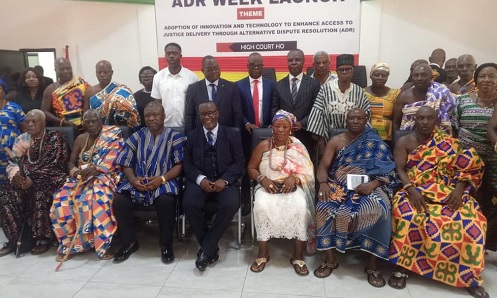
Chief Justice launches ADR Week
The Chief Justice, Justice Paul Baffoe-Bonnie, yesterday launched the Alternative Dispute Resolution Week in Ho, with a call on lawyers to encourage clients to opt for ADR.
“ADR represents a credible and efficient complement. Through mediation, arbitration, conciliation, and negotiation, disputes can be addressed in a manner that is less confrontational, less costly and significantly faster,” he said.
The event was on the theme: Adoption of innovation and technology to enhance access to justice delivery through alternative dispute resolution.”
Advantages
Justice Baffoe-Bonnie said that one of the advantages of ADR was its ability to preserve relationships.
He said in many of the disputes within families, workplaces, business partnerships, and communities, ADR remained essential in resolving such disagreements by providing opportunities for reconciliation and mutual respect.
Litigation on the other hand, often strained or permanently damaged relationships.
“Rather than limiting parties to strict application of legal rules, ADR empowers the parties to craft solutions that reflect their true interest, priorities and circumstances to ensure sustainable outcomes of the cases,” Justice Baffoe-Bonnie added.
He revealed that over two decades, the Court Connected ADR had significantly supported the judiciary by reducing caseloads and improving the speed at which justice was delivered, adding that “many cases resolved through ADR never return to the court for further disputes or appeals”.
The Chief Justice further assured lawyers that ADR would not take away their fees due them and so they should not be hindrances to ADR.
Achievement
The Court of Appeal Judge in-charge of ADR, Justice Angelina Mensah-Homiah, said since 2010, ADR had settled more than 37,000 cases, adding the Judicial Service would continue to work with lawyers and various stakeholders to encourage more clients to go for ADR.
The President of the Volta and Oti Bar Association, Moses Ayine Asampoa, also described ADR as a simple and less expensive process that ensured win-win outcomes.
It also makes it possible for legal issues which were technical in nature to be handled by technocrats who would be appointed by parties as arbitrators.
Mr Asampoa said apart from sensitisation programmes to educate the public on the availability and processes of ADR, there was also the need to introduce innovations and technology in the process to make it more effective.
For his part, the Volta Regional Minister, James Gunu, said through ADR, and with the power of digital transformation, justice could be brought closer to the people.
